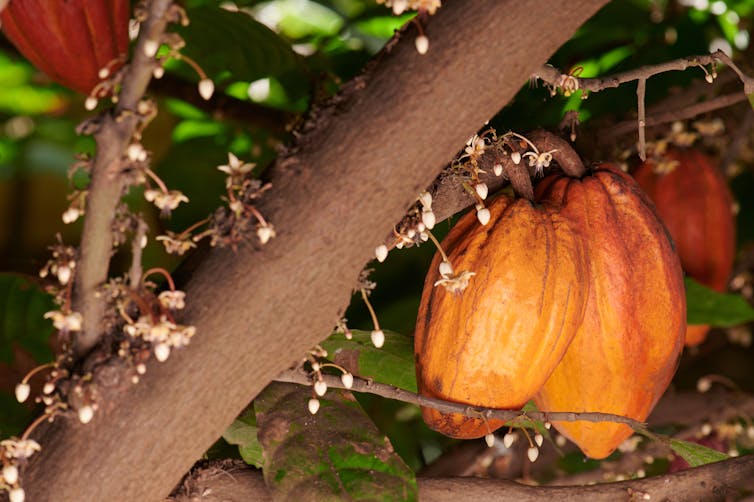Tens of hundreds of thousands of chocolate bunnies get offered within the U.S. each Easter. Listed below are six articles about chocolate from The Dialog’s archive – nice studying whilst you’re nibbling the ears off your personal bunny (should you’re one of many three-quarters of Individuals who begin on the prime).
1. Meals scientist on cocoa chemistry
Chocolate bunnies don’t develop on bushes – however cacao pods do. It takes a variety of processing to get from the uncooked agricultural enter to the completed output.
Meals scientist Sheryl Barringer from The Ohio State College wrote about numerous chemical reactions which might be a part of the transformation of beans into chocolate. One is the Maillard response, the identical factor that provides the browned bits on roasted meats or a bread’s golden crust their taste. Barringer additionally explains that bizarre white stuff – referred to as bloom – which may seem in your Easter goodies in the event that they grasp round for some time. (Don’t fear, it’s nonetheless edible.)
2. Chocolate is a fermented meals
Meals science Ph.D. candidate Caitlin Clark from Colorado State College focuses her analysis on the microbes chargeable for a lot of chocolate’s taste. As a fermented meals, chocolate is dependent upon yeast and micro organism to assist flip a uncooked ingredient into the deal with you may acknowledge.
Clark described how the microorganisms that happen naturally in a given geographical location may give high-end goodies their “terroir” – “the attribute aptitude imparted by a spot” you is likely to be extra used to interested by with regard to wine.
À lire aussi :
Chocolate’s secret ingredient is the fermenting microbes that make it style so good

dimarik/iStock through Getty Pictures Plus
3. Pollinators are necessary a part of course of
Cacao growers depend on one other tiny ally to pollinate their crop. Entomologist DeWayne Shoemaker from the College of Tennessee described the mini flies – significantly biting midges and gall midges – that get the job achieved. “Pollinators should choose up pollen from the male elements of a flower of 1 tree and deposit it on the feminine elements of a flower on one other tree,” Shoemaker wrote.
However as much as 90% of cacao flowers don’t get pollinated in any respect. Folks can hand-pollinate the little flowers, nevertheless it stays a thriller which different bugs may do the job within the wild.
À lire aussi :
Tiny cacao flowers and fickle midges are a part of a pollination puzzle that limits chocolate manufacturing
4. Baby labor is chocolate’s bitter secret
Harvesting and processing cacao is labor-intensive. To fulfill this want, some farmers flip to youngster labor. Cultural anthropologist Robert Ulin from the Rochester Institute of Expertise described how the worldwide chocolate trade is tied to inequality through exploitative labor practices.
“The biggest chocolate corporations signed a protocol in 2001 that condemned youngster labor and childhood slavery,” Ulin wrote. However he famous that customers might want extra info to ensure their buy energy helps “honest labor practices within the chocolate sector.”
À lire aussi :
Some chocolate has a darkish facet to it – youngster labor

F.J. Jimenez/Second through Getty Pictures
5. Not protected for furry relations
Consuming a ton of chocolate might be not a wholesome selection for anybody. However even a little bit little bit of chocolate could be lethal for canine and cats.
In an article about every kind of vacation meals which might be unsafe for pets, veterinarian and researcher Leticia Fanucchi from Oklahoma State College defined the chemical substances on this human delicacy that may trigger deadly “chocolate intoxication.” Don’t delay getting veterinary assist in case your pet does raid your Easter basket.
À lire aussi :
Vacation meals could be poisonous to pets – a veterinarian explains which, and what to do if Rover or Kitty eats them
6. An enslaved chocolatier in colonial America
An enslaved cook dinner named Caesar, born in 1732, was one of many first chocolatiers within the American colonies. Historic archaeologist Kelley Fanto Deetz from the College of California, Berkeley described how Caesar “would have needed to roast the cocoa beans on the open fireside, shell them by hand, grind the nibs on a heated chocolate stone, after which scrape the uncooked cocoa, add milk or water, cinnamon, nutmeg or vanilla, and serve it piping scorching.”
Cocoa was a scorching commodity for Virginia’s white elite throughout this era, when it was a culinary part – together with pineapples, Madeira wine, port, champagne, espresso and sugar – of the Columbian Alternate.
Editor’s observe: This story is a roundup of articles from The Dialog’s archives.

